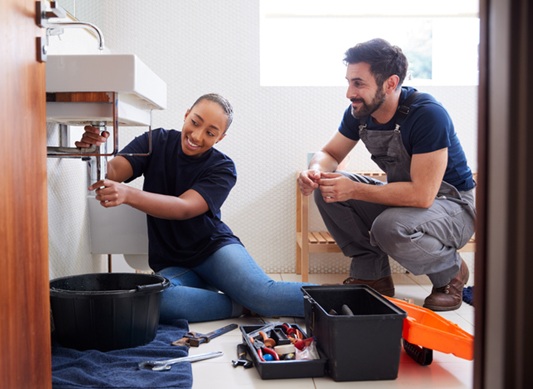A Guide to Plumbing Apprenticeships
Reading time: 4 minutes
Becoming trained as a plumber also allows you to enter a working environment where there is continuous professional development. You can even look into becoming an expert in a specialist area, such as how to install renewable systems or fire sprinkler systems around buildings.
An apprenticeship in plumbing is a fantastic route into this trade if you are over the age of 16. So here we explain everything you need to know about getting started with this form of education.
How do plumbing apprenticeships work?
A plumbing apprenticeship will see you being employed by a plumbing company, so that you have access to on-site work experience while learning the trade.
However, at least 20 per cent of your standard working hours must be spent on training when you are an apprentice. This studying can be factored into your schedule on a weekly or monthly basis, or sometimes as an entirely separate block of dedicated time.
You may also be doing your apprenticeship training at the place where you work as a plumber, at a college or other facility provided by your apprenticeship training provider, or completely online. Your training provider will inform you about this at the start of an apprenticeship programme.
Different levels of plumbing apprenticeships explained
There are two levels for you to enter when training to become a plumber – each with their distinct entry requirements. See where your qualifications and experience will place you by considering the following:
-
Level 2 Plumbing & Heating Apprenticeship – An intermediate apprenticeship which is the equivalent of holding five GCSEs at Grade C/4+, with no eligibility criteria generally needed.
-
Level 3 Plumbing & Heating Apprenticeship – An advanced apprenticeship which is the equivalent of holding two A-Level passes.
These are available to those who have completed the Level 2 Plumbing & Heating Apprenticeship or have gained five GCSE passes.
Take note though that the structure and other aspects of a plumbing apprenticeship can differ depending on the home nation you will be based in when studying for your qualifications.
Check out the official England, Northern Ireland, Scotland and Wales apprenticeship hubs for specific advice about becoming an apprentice in each nation.
How long is a plumbing apprenticeship?
The length of a plumbing apprenticeship will also depend on the part of the UK that you are studying the trade…
-
In England, an apprenticeship in plumbing usually takes four years to complete.
-
In Northern Ireland, an apprenticeship in plumbing usually takes four years to complete.
However, this period is split between two years studying for a level 2 qualification first and then another two years to gain a level 3 qualification.
-
In Scotland, an apprenticeship in plumbing usually takes three years to complete.
-
In Wales, an apprenticeship in plumbing usually takes three years to complete.
However, this period is split between two years studying for an entry-level level 2 NVQ and then another year to gain an industry-recommended level 3 NVQ.
Plumbing apprenticeship wages
The year that you are in for your apprenticeship studies and your age will affect how much you are paid.
As set out by GOV.UK, those aged between 16 and 18 years old and anyone who is 19 years old or over and in the first year of their apprenticeship will be on the National Minimum Wage rate. This is £7.55 currently.
You will be entitled to be paid the National Minimum Wage or National Living Wage rate for your age if you have completed the first year of your apprenticeship and are 19 years old or over. Click here to discover what the current rates are.
As an apprentice, you must be paid for your standard working hours and undergoing any training that forms part of your apprenticeship. If your apprenticeship includes studies for English and Mathematics qualifications, you need to be paid for this studying as well and this should be within your normal working hours.
We hope this guide has helped you to understand where to get started on applying for a plumbing apprenticeship. Don’t forget we have excellent career guides about becoming a builder, carpenter, joiner or roofer too, if you have your heart set on becoming a professional tradesperson but unsure which career path to pursue.
Disclaimer: Information displayed in this article is correct at the time of publication, but note that legislation changes periodically. The information contained on this page is intended as an overall introduction and is not intended as advice from a professional. Travis Perkins aims to avoid, but accepts no liability, in the case that any information stated is out of date.











